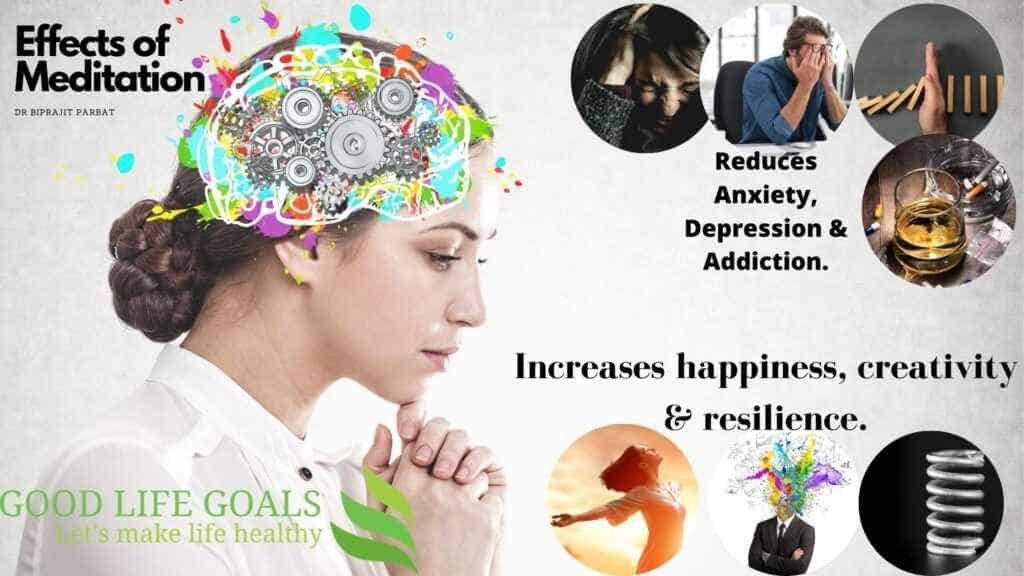Why mediation is important ?
Meditation is the practice of thinking deeply or focusing one’s mind for some time. While many forms of meditation exist, the main purpose of it is a feeling of inner peace and relaxation which can reduce anxiety and depression.
Depression continues to be a serious health issue among millions of people. It affects about 20% of adults of 65 years of age.
Regular depression leads to higher risks for heart diseases and even death.
Researchers from Johns Hopkins University in Baltimore did analyze 19,000 meditation studies and 47 trials. Through their research and findings published in JAMA Internal Medicine on Monday, suggest that mindful meditation does help manage –
- psychological stresses like anxiety, depression, and
- pain,
- prevent sleep issues,
- prevent substance abuse and
- prevent weight gain.

With that in mind, let’s take a look at the 12 ways meditation helps reducing anxiety and depression.
- Meditation decreases activity in the brain: “Me Center”. According to a study carried out at Yale University, mindfulness meditation reduces activity in the default mode network (DMN) – the brain network responsible for self-referential thoughts and mind-wandering.
- Causes Volume Changes in Key Areas of the Brain. A study suggests that mindfulness meditation may lead to decreases in brain cell volume in the amygdala – which is attributed to fear, anxiety, and stress.
- Helps the brain is by protecting the hippocampus. Study has shown that people who meditated 30 minutes a day for eight weeks boosted the volume of gray matter in their hippocampus. Additionally, another research has shown that people with a smaller hippocampus are more prevalent to recurrent depression.
- Meditation can alter reaction to stress and anxiety. Meditation trains the brain to return to focus when emotions and negative thinking intrude.
- Increases imagination and creativity. Meditation allows us to tap the deeper, wiser dimensions of our minds, which tend to speak in whispers.
- It can help with addiction. Research has found that mindfulness training can help people recover from various types of addiction.
- It helps you reduce negative emotions and gain a new perspective on stressful situations. According to Dr. Denninger, you tend to ignore the negative sensations of stress and anxiety when you meditate. Meditation can give you a sense of peace, balance, and calm that’s beneficial for both your overall health and emotional well-being.
- Meditation can help you build skills to manage your stress and increases your self-awareness.
- It helps switch from reactive fight-or-flight responses to a more thoughtful mode that’s crucial for balanced decision making.
- Finally, research shows that meditation can help reduce cancer survivors’ fear of the illness coming back. While meditation is not used to treat diseases like breast cancer, but its supportive care is designed to assist a person deal with the stress that comes with cancer. According to a study done on June 2, 2017, at the American Society of Clinical Oncology (ASCO), the fear of cancer recurrence was reduced significantly in 222 cancer survivors who had undergone meditation intervention.
How to meditate?
The basics of meditation that can take you far and help you to clean your mind is to practice Stillness of Non-judgmental Awareness (S.N.A.).
Stillness of Non-judgmental Awareness
Sit comfortably and close your eyes. Avoid distractions and relax. Now all you have to do is just observe your breath. The thoughts will come and go. Some thoughts may able to capture your attention and makes you run behind it. If that happens – just bring back your attention to your breath. Do not judge yourself or any of your thoughts. It is just you, your breath and the stillness. The thoughts will come and go before your non-judgmental awareness. This is how you can achieve S.N.A. – the simplest form of meditation.
Conclusion –
From years of research, it is clear that meditation brings physical changes in our brain. It rewires our brain and makes it less anxious. It is necessary for maintaining mental hygiene on a daily basis. We can clean our body, our clothes, our teeth and even our bowels regularly. But how would you clean your mind? Meditation is the answer. Practice Stillness of non-judgmental aware ness on a daily basis to clean your mind.





